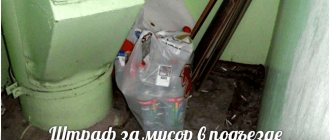The legislation of the Russian Federation guarantees every citizen the right to live in an environmentally friendly and safe environment. Any actions that violate this right will entail inevitable punishment. However, the problem of neighbors leaving trash in the entrance of an apartment building is extremely common. How to act in this case legally and effectively?
Neighbors throw construction and other rubbish out of windows and balconies - where can I complain?
Throwing garbage out of windows is subject to all of the listed articles and regulations.
In some regions of the country, such actions are punished even more severely (fine up to 4,000 rubles). Therefore, in general, the methods of combating this offense will be similar to those already listed.
Having previously recorded the fact of a violation using video or photography and realizing the pointlessness of peaceful negotiations with neighbors, you can submit statements to the following authorities:
- Management company (its employees will draw up a corresponding act and call the violator to order);
- Rospotrebnadzor and Roskomnadzor (will conduct an inspection of the activities of the littering resident and apply penalties);
- Ministry of Emergency Situations and Fire Supervision (after inspection, they issue several warnings to the violator, and then may impose a fine);
- Police (a statement is written to the district police officer, who can then send the case to court);
- District administration at the offender’s place of residence . In this case, an administrative commission is created that can call the “garbage man” to order. However, to submit an application you must have testimony from at least two witnesses.
What not to do with a silence breaker?
Roskoshestvo does not recommend resolving the issue on your own - making threats, getting into fights, writing offensive notes and damaging neighbors’ property. As experts say, in this case you may find yourself a victim if your neighbors report you to the police or go to court.
How to reduce noise from neighbors above? More details
My neighbors wash dishes at night. Can I complain?
No you can not. If the noise level does not exceed the norm, complaining about your neighbors will be useless. The noise level of a dishwasher ranges from 42 to 52 dB. The only solution to the problem is to study the PZT - whether the house was provided with proper sound insulation. Sound insulation in new houses is checked in accordance with SNiP 23-03-2003 “Noise Protection”. If its level does not comply with the norms and regulations, you can demand that the developer correct the situation. A complaint can be submitted to the State Housing Inspectorate and the Rospotrebnadzor Office for a specific municipality or region.
Possible fines for non-compliance with the rules
If fire safety requirements are violated, then, for the first time, neighbors can get away with just a warning. Repeated violation leads to the imposition of an administrative fine, which for individuals ranges from 1000 to 1500 rubles.
According to the Housing Code, there is also a fine for storing garbage; the amount ranges from 4,000 to 5,000 rubles.
Services that monitor sanitary conditions can also bring unscrupulous neighbors to administrative responsibility. In this case, the payment amount will be from 500 to 1000 rubles.
If we add up all the possible fines, littering the entrance becomes quite expensive, and it is unlikely that the neighbors will want to incur such losses again.
Where to contact
If no methods work on your neighbors, then you should file complaints with the relevant authorities.
Firstly, this is the management company / HOA / chairman of the board, depending on the chosen method of managing the apartment building. Most likely, a preventive conversation will be held with the owners of the apartment, and they are strongly recommended to stop littering the entrance.
If this does not help, then you can write a statement to the local police officer. It is important to collect as many witnesses and evidence as possible, for example, photos and videos that show violators throwing garbage into the entrance.
If this is not done, then the neighbors may simply say that they have nothing to do with this particular garbage. If their involvement in violations is proven, a protocol is drawn up, which is later submitted to the court with a corresponding claim to impose a fine.
You can also contact the fire inspectorate and sanitary inspection authorities directly. They will be required to respond by conducting appropriate checks. In this case, you will also have to prove which neighbor is storing garbage in the entrance, thereby violating the current rules and regulations. Based on the results of such an inspection, a fine in the prescribed amount will be imposed on violators.
If none of the measures have had the desired impact, you can continue to file complaints with the listed authorities until the neighbors finally decide to send their trash to the landfill.
The main thing to remember when garbage appears in the entrance is that you definitely need to fight this phenomenon.
Such an unscrupulous attitude towards your home can lead to truly unpleasant consequences that will affect all residents without exception.
Garbage in the local area
A plot of land adjacent to an apartment building (MKD) is the common property of the homeowners (Federal Law No. 189, Article 16). They pay for cleaning and maintenance of the territory. The law obliges owners to carefully exploit common areas and adjacent areas.
Who cleans
The question of who will clean around the house is decided at a meeting of owners. Based on its results, the management company enters into an agreement with a service organization or hires janitors.
Cleaning up trash in front of your home is on the list of necessary landscaping jobs. This includes cleaning the area from household waste and litter of natural origin.
If residents are not satisfied with the quality of workmanship, they can file a complaint with regulatory organizations. Another option is to terminate the contract with the management company.
Construction waste is not related to household waste. The owner of the apartment or the contractor who performed the work must remove them after repairs. In order for a company to handle recycling, this clause must be specified in the service agreement.
Construction waste cannot be thrown into solid waste containers. According to SanPin rules, construction waste cannot be left near bins.
Reasons for the ban:
- dimensions can be large (larger than the container),
- waste has a hazard class of 3-5 (harmful to the environment and human health),
- Some of the litter is included in the group of flammable items.
Garbage in public places - what does the law say?
Waste disposal is regulated by several regulatory documents.
Clause 3.7.2. Resolution of the State Construction Committee of the Russian Federation No. 170 clearly states that waste should be collected only in places specially designated for this:
- garbage cans and containers;
- urns;
- waste bins or storage bins;
- at specialized sites.
IMPORTANT! According to the same article, the place for waste disposal should be no closer than 20 meters from the doors and windows of the house and no closer than 100 meters from the entrance.
Disposing of waste in any other place is prohibited and may result in various types of liability:
- disciplinary;
- administrative;
- and even criminal (if this violation led to dangerous consequences for human life or the environment).
Article 8.1 of the Code of Administrative Offenses for unauthorized dumping of garbage in the wrong place (at the entrance, under windows and doors, in corridors) provides for a fine of 1,000 to 2,000 rubles (for citizens). For legal entities and officials, such a violation will cost much more – up to 250 thousand rubles.
The amount of the fine varies depending on the specific region of the country and the circumstances of the violation. If the culprit has not been prosecuted for such actions before, or has not caused significant damage, he may get off with a warning. If its unauthorized dumping led to infection of neighbors and serious damage to the ecology of the home, the punishment could reach 8 years in prison.
Victims of the actions of unscrupulous neighbors, in accordance with Chapter 59 of the Civil Code of the Russian Federation, can apply for compensation for moral and material damage.
IMPORTANT! According to the law, the citizen himself is responsible for his waste until it is taken to a landfill. Therefore, it is he who will have to answer for non-compliance with fire safety rules and sanitary standards.
What is the “maximum permissible noise level”?
According to sanitary standards, the permissible noise level is noise that does not harm hearing even with prolonged exposure to the hearing aid.
Question answer
How can you make your neighbors hear you less? As noted by Roskachestvo, the maximum permissible noise levels in residential apartments are listed in SP 51.13330.2011 and GOST 12.1.036-81.
So, in the daytime from 7:00 to 23:00 the noise level can be 40–55 decibels. For comparison, 40 decibels is a sound equivalent in volume to normal soft speech, and 55 decibels is a sound similar in intensity to a running car engine. At night, between 11:00 pm and 7:00 am, the noise level can be 30–45 decibels, which is roughly the same as a dishwasher or washing machine.
Who and how can be held accountable for litter in the entrance?
In Russian cities, inspection authorities rarely visit entrances to monitor sanitary conditions. This is not within their authority. Cleanliness in the entrances is the business of the people living in them.
Citizens cannot legally punish a neighbor who violates health and safety standards, but they have the opportunity to appeal to those who have leverage over violators. This:
- police;
- sanitary and epidemiological station;
- Fire Department;
- Roskomnadzor.
Contacting these authorities should be undertaken when other methods have failed. In order for a violator to be punished for littering in the entrance, you must provide evidence of his guilt.
What are the penalties for violating the rules?
The size of the sanctions depends on the category of persons acting as violators and the severity of the violation:
- Sanitary and hygienic rules are not followed: ordinary residents pay 500.00 - 1,000.00 rubles; officials - 1,000.00 - 2,000.00 rubles and, accordingly, legal entities - 10,000.00 - 20,000.00 rubles; individual entrepreneurs – 1,000.00 – 2,000.00 rubles.
- The requirements for the maintenance of multi-apartment residential buildings are not met: 4,000.00 - 5,000.00 rubles are collected from officials; from legal entities – 40,000.00 – 50,000.00 rubles.
- Fire safety rules are not followed: residents will be fined 2,000.00 - 3,000.00 rubles; legal entities pay 150,000.00 – 200,000.00 rubles; officials – 6,000.00 – 15,000.00 rubles; Individual entrepreneur – 20,000.00 – 30,000.00 rubles.
Important: If the violator is an individual entrepreneur or organization, the punishing authority has the right to suspend the activities of the person being punished for up to 90 days.
What to do if neighbors leave trash in the entrance?
Nobody likes to conflict. However, patience is not a virtue in all cases. If your neighbors store garbage in their entrance, this is a flagrant violation of your rights and the law of the Russian Federation. You are obliged to respond to such actions. Not in all cases you will have to go into conflict. Often situations are resolved peacefully.
Ways to solve the problem
There are 2 ways to solve the problem:
- negotiate with the offender;
- contact one of the authorities dealing with such issues.
Peaceful methods of struggle
Not in every situation it is worth bringing the matter to complaints to the appropriate authorities and administrative fines. In some cases, you can try to solve the problem peacefully.
First, you need to try talking to your neighbors who regularly litter in the common area. It is worth trying to convey to them that such actions are not only unpleasant for the other residents, but can also lead to quite unpleasant consequences.
It is important to calmly explain the whole situation, without leading the matter to a serious scandal and swearing. It is quite possible that a simple verbal warning will be effective enough to ensure that garbage is removed on time and in a specially designated place.
Sometimes it happens that an apartment is rented out, and the tenants start littering, arguing that they are not the owners and therefore do not owe anything to anyone. In this case, you should contact the owner directly. The prospect of receiving a rather large fine can motivate him to pacify unscrupulous tenants.
You can also use alternative options for dealing with littering neighbors, especially if everyone has long been tired of making comments.
For example, you can print out an advertisement stating that littering in the entrance is an offense, provide specific articles and possible fines. The main thing is to compose it correctly, with an abundance of clerical phrases, so that it looks like an official warning.
It is possible that this will have an effect on unscrupulous tenants. The prospect of getting a fine can help keep stairwells clean.
Sometimes, neighbors may begin to wonder if they are doing something wrong if their bags of garbage are moved under their own front door. As a rule, trash is re-sent to a landfill.
If pieces of furniture are displayed in a common corridor or vestibule, you can try to distribute them. Perhaps someone will really need old cabinets or chairs, for example, for a summer house.
You can write an announcement about the distribution of these items, and then their owners will take action and transport them to another place that is more suitable for such rubbish.
How else can you force them to remove the trash that is being thrown out the door?
Often, creative residents use original methods of dealing with neighbor’s garbage that clutters the entrance:
- Moving abandoned trash under the door of a careless neighbor. For many “scavengers”, one such “magic move” is enough; for others, they will have to work long and hard. Eventually, the offender gets tired of having to wade through piles of waste to get to his home, and he stops littering.
- Placing motivating and ironic pictures on the walls on the topic of maintaining cleanliness in the entrance. In some cases, appeals obtained from the Internet and printed on a home printer in the spirit of “When you leave your trash here, don’t forget to grunt!” turn out to be very effective.
- The collected video and photographic evidence exposing littering residents can also be printed and posted for public viewing. For greater effect, it is recommended to indicate which articles and penalties their actions fall under.
- If neighbors have a habit of placing large construction debris or old furniture in common corridors and stairwells, you can post a notice nearby about the free distribution of these items. In this case, either the “scavengers” will be forced to take urgent measures to move their property to another place, or the trash will be sorted by those who need it.
- In places converted by violators into landfills, a notice is often posted saying “You are being filmed by a hidden camera!” Even in the absence of such, unauthorized waste disposal often stops.










